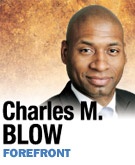Subscriber Benefit
As a subscriber you can listen to articles at work, in the car, or while you work out. Subscribe Now
 When Occupy Wall Street sprang up in parks and under tents, one of the many issues the protesters pressed was economic inequality. Then, as winter began to set in, the police swept the protesters away, the movement all but dissipated.
When Occupy Wall Street sprang up in parks and under tents, one of the many issues the protesters pressed was economic inequality. Then, as winter began to set in, the police swept the protesters away, the movement all but dissipated.
But one of its catchphrases remained, simmering on a back burner: “We are the 99 percent.” The 99 percent were the rest of us, struggling to make a living while the stiff, arthritic grip of the top 1 percent sought to manipulate the social, political and economic levers of powers.
This idea of the tiny top against the broad bottom even became a running theme in last year’s presidential election. In his January 2012 State of the Union address, President Obama said, “We can either settle for a country where a shrinking number of people do really well while a growing number of Americans barely get by, or we can restore an economy where everyone gets a fair shot, and everyone does their fair share, and everyone plays by the same set of rules.”
Mitt Romney would commit his own pratfall of percentage politics, famously defaming the “47 percent.”
Still, it was not clear if the greater narrative of income inequality had legs and if it would move forward as the economy turned up.
I believe it has.
There are signs that the narrative may have taken hold in some parts of the electorate beyond the protesters in the parks and beyond a presidential campaign between an up-from-the-bottom, charismatic incumbent and his awkward aristocratic competitor.
Last month, the nation’s largest city—the heavily Democratic New York City, where the Occupy Wall Street movement was born—sent a message of stinging repudiation to the nation’s wealthiest mayor, Michael Bloomberg.
The most progressive Democratic candidate, Bill de Blasio, who had in effect run as the anti-Bloomberg, was the clear leader in the Democratic primary.
And, for the most part, the city’s citizens seem to have eschewed identity politics in favor of class politics. De Blasio, who is white, was very strong in the mostly black areas of Brooklyn, Queens, Harlem and the Bronx; Bill Thompson, who is black, was strong on mostly white Staten Island; and Christine Quinn, who is openly gay, lost the Chelsea-Union Square area of Manhattan.
According to a recent Pew Research Center poll, fewer than 8 percent of respondents thought that, after the recent recession, government policies have helped the poor, the middle class or small business a great deal.
And as the stock market soars for those with enough money to be in it, a Gallup poll found that one in five Americans say they have struggled to afford food in the last year and that access to basic needs is near a record low.
According to the Bureau of Labor Statistics, the job market is dire, despite what the unemployment rate says. As Bloomberg Businessweek (yes, that Bloomberg) put it:
“The worrisome part is why the rate fell. The size of the work force declined by about 300,000 and the participation rate fell to 63.2 percent from 63.4 percent—the lowest since August 1978.”
The rich have recovered, but the rest still struggle. This cannot long stand.
So, the Occupy Wall Street movement may, in the end, have a rather clear legacy: ingraining in the national conscience the idea that our extreme levels of inequality are politically untenable and morally unacceptable, and that eventually the 99 percent will demand better.•
__________
Blow is a New York Times columnist. Send comments to [email protected].
Please enable JavaScript to view this content.
